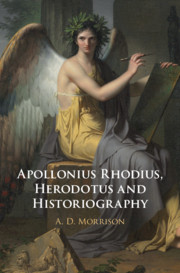Book contents
- Apollonius Rhodius, Herodotus and Historiography
- Apollonius Rhodius, Herodotus and Historiography
- Copyright page
- Dedication
- Contents
- Preface
- Abbreviations
- Introduction
- Chapter 1 Receiving Herodotus
- Chapter 2 Creating Authorities
- Chapter 3 Explaining the Past
- Chapter 4 Telling Stories
- Chapter 5 Greeks and Non-Greeks
- Chapter 6 Kings and Leaders
- Conclusions and Consequences
- Select Bibliography
- Index of Subjects
- Index of Passages
Introduction
Published online by Cambridge University Press: 13 January 2020
- Apollonius Rhodius, Herodotus and Historiography
- Apollonius Rhodius, Herodotus and Historiography
- Copyright page
- Dedication
- Contents
- Preface
- Abbreviations
- Introduction
- Chapter 1 Receiving Herodotus
- Chapter 2 Creating Authorities
- Chapter 3 Explaining the Past
- Chapter 4 Telling Stories
- Chapter 5 Greeks and Non-Greeks
- Chapter 6 Kings and Leaders
- Conclusions and Consequences
- Select Bibliography
- Index of Subjects
- Index of Passages
Summary
In fragment 43 of Pfeiffer’s edition of the Aetia (fr. 50 M.), Callimachus has the Muse Clio rest her hand on the shoulder of her sister as she begins to speak for the second time,1 in answer to one of his questions. The sister is unnamed, but it is tempting to think of this as Calliope,2 who probably spoke second of the Muses in the Aetia,3 and was often characterised as the ‘senior Muse’ in ancient texts.4 This vignette hints at the close relationship between epic and historiography, the investigation of which is the subject of this book.5 This closeness has, of course, long been recognised: Herodotus himself was characterised as Ὁμηρικώτατος (‘most Homeric’) by [Longinus] (de subl. 13.3), and modern scholarship has explored at length the Homeric affinities of Herodotean historiography6 so that the roots of historiography in epic are as clear to us as they were for Archelaus of Priene in his Apotheosis of Homer, who depicts History among those sacrificing before the divine Homer, or for the makers of the ‘Salmacis inscription’ which commemorated Herodotus as the ‘Prose Homer of History’.7 The great majority, however, of work on the relationship of historiography and epic has concerned how the former adapts the latter, especially (of course) Homer.8 Less attention has been paid to investigating systematically the degree to which Greek epic after Homer responds to and makes use of the historiography which itself developed and modified various aspects of Homeric epic. There are, however, good reasons for thinking that historiography as a mode of discourse (its tropes, structures, means of characterising individuals, fields of interest), as well as the particular descriptions of places and peoples contained within particular texts, were exploited by Apollonius and other poets. Both epic and history are forms of long, complex narrative, often dealing with the same or similar locations, albeit from different perspectives and with different aims.9 Moreover, the two genres as found in Greek literature were able also to show some important overlap in subject matter and content, since there existed from the Archaic period onwards several examples of epics with a distinct historical dimension, such as the Corinthiaca of Eumelus,10 which connected historical peoples and places with mythic or historical forebears.11
- Type
- Chapter
- Information
- Apollonius Rhodius, Herodotus and Historiography , pp. 1 - 26Publisher: Cambridge University PressPrint publication year: 2020

